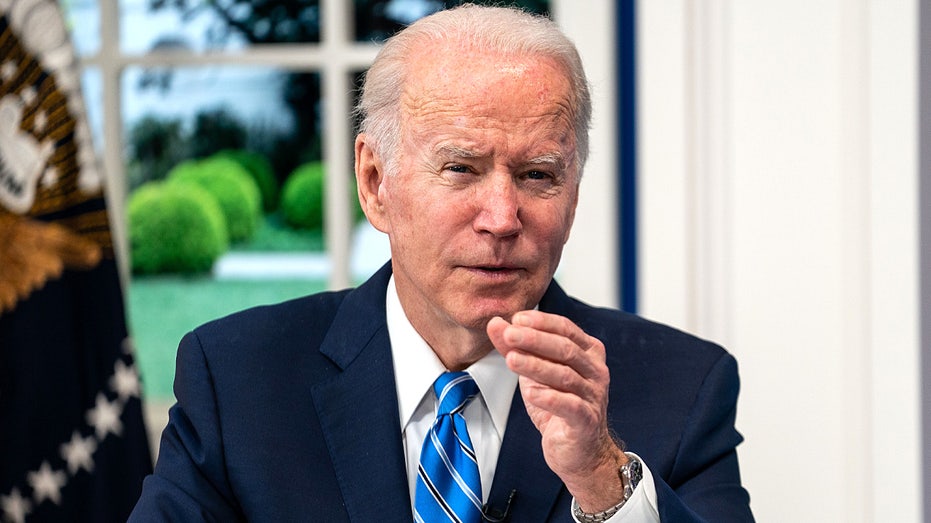Democrats look to salvage wreckage of Biden's spending plan in 2022
Will Sen. Joe Manchin ‘cave’ on Build Back Better?
National Taxpayers Union EVP Brandon Arnold and Walser Wealth Management CEO Rebecca Walser discuss Sen. Joe Manchin’s stance on the Build Back Better plan and what’s in store for Congress in 2022.
Democrats are kicking off the new year with hopes of salvaging the fragments of President Biden's signature economic spending plan, just weeks after key moderate Sen. Joe Manchin thrashed the party's hopes of passing the massive social spending and climate bill.
Congressional momentum for the Build Back Better plan crumbled at the end of December, when Manchin – citing the highest inflation in a generation – abruptly withdrew his support for the bill during an interview on "Fox News Sunday." But the West Virginia Democrat has spoken with the president since then, people familiar with the matter told FOX Business, and has publicly telegraphed key changes that could elicit his support for a narrower version of the bill.
WHERE ARE SURGING CONSUMER PRICES HITTING AMERICANS THE HARDEST?
Manchin's chief concerns with the legislation include the one-year expansion of the boosted child tax credit payment, which expired in January without congressional action, as well as some provisions intended to combat climate change. He has also insisted the measure should go through Senate committees in order to examine its economic effect and focus on rolling back the 2017 Trump tax cuts – something that Sen. Kyrsten Sinema, D-Ariz., opposes.
Sen. Joe Manchin, D-W.Va., speaks to the Economic Club, Tuesday, Oct. 26, 2021, in Washington. (AP Photo/Jacquelyn Martin) (AP Photo/Jacquelyn Martin / AP Newsroom) "The only reason I even voted to get on reconciliation was to fix the taxes so that everybody paid their fair share," Manchin said on West Virginia MetroNews two weeks ago. "The ultra-wealthy, corporations that weren't paying anything, everyone would pay their fair share." But Democrats are beginning to pick up the pieces of the wreckage with the 2022 midterm elections in sight, and have floated the possibility of breaking up the package into smaller pieces that would be ostensibly easier to pass. "That's a strategy decision that's being negotiated," Sen. Ben Cardin, D-Md., recently told "Fox News Sunday." "We are open to a way to reach the finish line. We want to make it as comprehensive as possible, because the needs are just there." WASHINGTON, DC: President Joe Biden and the White House COVID-19 Response Team participate in a virtual call with the National Governors Association from the South Court Auditorium of the Eisenhower Executive Office Building of the White House Comple ((Kent Nishimura / Los Angeles Times via Getty Images) / Getty Images) The problem with that strategy is that Senate rules limit how frequently bills can be passed using budget reconciliation, the tactic that Democrats are employing to avoid a Republican filibuster. Cardin said there is "unanimity" within the caucus to deliver a bill to Biden, noting the president is directly involved with negotiations. Senate Majority Leader Chuck Schumer is also pushing for a vote on the giant spending package this month, though it's guaranteed to fail without Manchin's support. President Joe Biden speaks about his infrastructure plan and his domestic agenda during a visit to the Electric City Trolley Museum in Scranton, Pa., Wednesday, Oct. 20, 2021. (AP Photo/Susan Walsh / AP Newsroom) The $1.7 trillion legislation included an array of provisions including universal pre-kindergarten, paid family leave, measures to combat climate change and Medicare and Medicaid expansions. It also would have extended the boosted child tax credit payments by one year. Democrats proposed paying for the bill by establishing an ultra-millionaires tax and imposing a 15% levy on the income that wealthy companies report to shareholders. GET FOX BUSINESS ON THE GO BY CLICKING HERE Since Biden became president one year ago, Congress has approved a staggering $3.1 trillion in federal spending. The nation's debt level is already at a historic high of $29 trillion and is on track to surpass $30 trillion. Source: Read Full Article



